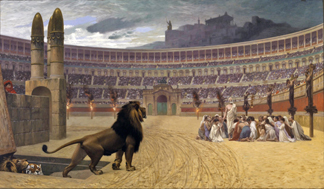
Volume 18, Issue 12 (March 20, 2016)
Overcoming Political Anxiety
By Kyle Pope

The year I was born was the year John F. Kennedy was assassinated. Prior to his election as president many Christians voiced strong opposition to the election of a Roman Catholic president. Their concern was multi-fold. Some feared that statements then Senator Kennedy had entered into the congressional record for January 17, 1956 describing non-Catholic beliefs as “heresies” might lead to the further use of public resources to promote his views.1 Others feared that the hierarchical structure of the Roman Catholic Church would inevitably influence the actions of any Chief Executive that was a Roman Catholic. 2 Although President Kennedy’s term was short Christians who oppose Roman Catholic doctrine still enjoy the freedom to do so, in spite of the legitimate concerns they held at the time.
When I was five years old, in 1968 America faced another of a series of “long hot summers.” The previous year had seen 159 race riots throughout the nation. The day before my fifth birthday, civil-rights leader Martin Luther King Jr. was assassinated, further aggravating the turmoil. Following the Tet Offensive at the beginning of the year, American support of the Vietnam War began to shift. Bitter political fighting following Lyndon Johnson’s decision not to seek a second term, grew to a fever-pitch when prospective presidential candidate Senator Robert F. Kennedy, was also assassinated. The “sexual revolution” was leading to a growing acceptance of “free-love,” sexual immorality, and “no-fault” divorce. In the face of such chaos, Christians struggled to explain the cause of such an increase in moral and civil disorder. Some Christians correctly identified the growing rejection of a belief in fundamental biblical teachings about God and judgment as contributing factors to this condition.3 Eventually the war ended, tensions eased, and although morality continues to decline Christians continue to uphold scriptural teaching.

The year before I graduated from High School US citizens had been held for an extended period of time by a revolutionary regime in Iran. The Soviet Union had invaded Afghanistan and sponsored communist expansionism in Guinea, Mozambique, Angola, Ethiopia, and Nicaragua. Presidential candidate Ronald Reagan, the former governor of California, promised to rebuild the military, secure the release of the hostages, and “roll-back” communism. Opponents feared that Reagan’s hard-line posture could lead to an apocalyptic clash between nuclear super-powers capable of annihilating life on earth. Brethren facing the possibility that “some insane person might trigger a button which will ignite a nuclear war,” took comfort in the recognition of God’s sovereignty even in times of uncertain dangers.4 President Reagan was elected the year I graduated and the years that followed saw the end of the “cold war,” the fall of global communism, and no nuclear holocaust.
As I write this article I am in my 52nd year. The threat of global communism and nuclear annihilation has been replaced by growing radical Islamic terrorism. Candidates for president include the first self-identified Socialist US Senator, a former first-lady, Senator, and Secretary of State who is currently under investigation by the FBI, and a billionaire real-estate developer, and reality TV star who has promised an especially aggressive response to trade, immigration, and terroristic threats. This has produced an atmosphere of political violence, aggressive political rhetoric, and anxiety on the part of people on all sides of the political spectrum about what the future may hold.
How should Christians overcome such anxiety? How may we face the different challenges each generation confronts without fear, with faith, and the peace of mind that can be found only in Christ?
1. Remember, This World is Not Our Home. The apostle Paul taught the Philippians, who were Roman citizens in a city that was in Macedonia, “our citizenship is in heaven, from which we also eagerly wait for the Savior, the Lord Jesus Christ” (Phil. 3:20, NKJV). Peter urged Christians to view themselves “as sojourners and pilgrims” and to “abstain from fleshly lusts which war against the soul” (1 Pet. 2:11). According to historians, prior to World War II a common view held by many members of churches of Christ was a very rigid sense of cultural separatism. David Lipscomb, following the Civil War wrote a booklet entitled Civil Government: Its Origin, Mission and Destiny and the Christian’s Relation to It in which he argued that Christians should not serve in the military, vote, hold political office, or participate in civil government.5 World War II, however, saw the rise of a moral patriotism that led some Christians who once held separatists views to modify positions they previously held.6
While I do not believe the Bible demands this rigid view of separatism from the world, those who held such views may well have found it easier to remember our higher spiritual allegiance. Christians are citizens of a spiritual kingdom that “is not of this world” (John 18:36). This kingdom consumes all other kingdoms, “shall never be destroyed” and “shall stand forever” (Dan. 2:44). If we choose to vote, serve in the military, or even participate in civil government we must never forget that our first allegiance is to our heavenly citizenship. That not only means that we must obey God if these duties ever come into conflict (Acts 5:29), but it also means that the status of any political turmoil need not shape or sense of security.

2. Don’t Lose Perspective. The Holy Spirit led the Wise Man to declare, “That which has been is what will be, that which is done is what will be done, and there is nothing new under the sun.” (Ecc. 1:9). It is easy to feel as if the challenges presented to each generation are unique. To some extent that is true. What lies ahead has never been experienced in exactly the way it will play out in the future. That doesn’t mean that the same problems faced by Christians in the past are not common to us. In many cases those who have gone before us have faced challenges far worse that we will likely ever face. Who among us has faced execution for our faith? Who has been burned at the stake? Who has been thrown to the lions? Within the lifetime of many of us, as we saw above, we must acknowledge that if our worst fears were realized things would still not be as bad as events of the past. We must not allow anxiety to distort our view of the past or the future. Jesus commanded, “do not be anxious for tomorrow; for tomorrow will care for itself. Each day has enough trouble of its own” (Matt. 6:34, NASB).
3. Sometimes—Turn Off the News, Set Down the Paper, and Shut Off the Computer. When Jesus sent out the Twelve He commanded them, “I send you out as sheep in the midst of wolves. Therefore be wise as serpents and harmless as doves” (Matt. 10:16, NKJV). Recognizing that this world is not our home doesn’t mean we live our lives with our “heads in the sand.” We need to be wise to the dangers around us. We need to exert influence as “the salt of the earth” and “the light of the world” in opportunities that present themselves (Matt. 5:13-16). But, too much focus on the negative affairs of this world is counter-productive. The Wise Man said, “in much wisdom is much grief, and he who increases knowledge increases sorrow” (Ecc. 1:18). Christians, sometimes need to stop listening to the voices of turmoil, bad news, and discouragement and fill our minds with positive, spiritual encouraging things. This recharges our emotional batteries, reboots our attitudes, and helps us avoid being overwhelmed the next time we face news that could discourage us.
4. “Set Your Mind on Things Above.” When the Israelites were exiled in Babylon they took comfort in remembering their homeland. One Psalmist declared, “If I forget you, O Jerusalem, let my right hand forget its skill! If I do not remember you, let my tongue cling to the roof of my mouth—If I do not exalt Jerusalem above my chief joy” (Psa. 137:6-7). Paul taught the Colossians, “Set your mind on things above, not on things on the earth” (Col. 3:2). Too much focus on the things of this life will cause us to feel burdened and overwhelmed by the ebb and flow of life’s dark times. As a man “thinks in his heart, so is he” (Prov. 23:7). We must not allow the temporary affairs of this fleeting life to determine who we are.
5. Whatever May Come, Christ is On the Throne. Nebuchadnezzar was humbled in order that he would come to recognize, “the Most High rules in the kingdom of men, and gives it to whomever He chooses” (Dan. 4:25). Paul taught that the “authorities that exist are appointed by God” (Rom. 13:1). This does not mean that God directly chooses every political leader and rejects others—it means that all things only happen because God allows them to happen (cf. Matt. 10:29). That means we that whatever may happen we can trust that Christ is on the throne. When John was allowed to see the spiritual ascension of Christ to the throne an angel declared, “The kingdoms of this world have become the kingdoms of our Lord and of His Christ, and He shall reign forever and ever!” (Rev. 11:15). We may face hardships. There may be trials that lie ahead. There will be good leaders and wicked leaders, but whatever the future holds Christians can take comfort in knowing our King reigns—everything will be well in the end.
1 Martin, Luther W. 11.39 “Communism And Catholicism” The Gospel Guardian 11.39 (Feb. 12, 1960) 8-9 [online] http://www.wordsfitlyspoken.org/gospel_guardian/v11/v11n39p8-9b.html
2 Fisher, C. Wm. “Why Not a Roman Catholic President?” The Gospel Guardian 12.2 (May 12, 1960) 4-5 [online] http://www.wordsfitlyspoken.org/gospel_guardian/v12/v12n2p4-5.html
3 Frost. Jere E. “The Foment In America” The Gospel Guardian 20.19 (Sept. 12, 1968) 1-3 [online] http://www.wordsfitlyspoken.org/gospel_guardian/v20/v20n19p1-3a.html
4 Willis, Mike. “The Sovereignty of God” Guardian of Truth 25.2 (Jan. 8, 1981) 19-21 [online] http://www.truthmagazine.com/archives/volume25/TM025011.html
5 Available online at: https://archive.org/details/CivilGovernment
6 Harrell, David Edwin, Jr. The Churches of Christ in the Twentieth-Century (Tuscaloosa, AL: University of Alabama Press, 2000) 51-57.

